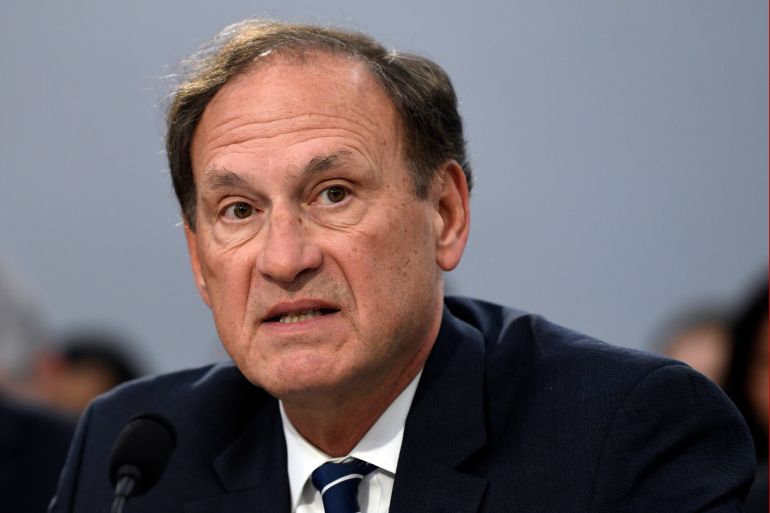US Supreme Court justice faces questions over donor-financed trip
An investigative story by a US news outlet is latest to raise questions about improper conduct by conservative justices.

The news outlet ProPublica has alleged that United States Supreme Court Justice Samuel Alito failed to disclose a private flight to Alaska, financed by a businessman whose interests have come before the court.
The revelations have renewed an outcry over ethics on the country’s highest court. On Wednesday, Democratic Senator Dick Durbin, the chairman of the Senate Judiciary Committee, said the court was in “an ethical crisis of its own making” .
Keep reading
list of 3 itemsUS Justice Clarence Thomas responds to unreported luxury travel
Justice Clarence Thomas failed to disclose luxury trips: Report
Durbin added that the Democrat-led panel would take up the question of ethics reforms when it reconvenes after the Independence Day holiday on July 4. “The reputation and credibility of the court are at stake,” he said.
Alito took to the op-ed page of The Wall Street Journal late on Tuesday to defend the flight, part of a luxury fishing vacation he took with billionaire hedge-fund manager Paul Singer in 2008.
The conservative justice denied that he had done anything inappropriate and accused ProPublica of “misleading” readers. Alito said Singer “allowed me to occupy what would have otherwise been an unoccupied seat on a private flight to Alaska”.
ProPublica valued the private flight at about $100,000 each way. According to the publication, Alito did not report the value of the trip on his required financial disclosure forms, in an apparent violation of ethics laws.
Years after the trip, in 2014, the Supreme Court weighed a case involving Singer, in a dispute with the country of Argentina. Alito voted with the majority in a 7-1 ruling in favour of Singer, resulting in a $2.4bn payment to his hedge fund.
Alito dismissed any possible conflict of interest, saying that nothing took place that would “cause a reasonable and unbiased person to doubt my ability to decide the matters in question impartially”.
By failing to disclose the private jet flight Singer provided, Alito appears to have violated a federal law that requires justices to disclose most gifts, according to ethics law experts. https://t.co/7ArFkuljvs
— ProPublica (@propublica) June 21, 2023
Alito is the latest justice to face allegations of improper behaviour and failure to disclose financial benefits from wealthy donors, some of whom have contributed to a decades-long effort to build the court’s current 6-3 conservative majority.
In April, a ProPublica article similarly found that Justice Clarence Thomas had failed to disclose that a wealthy businessman had paid for his luxury travel about a private jet and yacht.
Public trust in the nation’s highest judicial body has reached an all-time low, with the Associated Press-NORC Center for Public Affairs Research finding that, in 2022, just 18 percent of people said they had “a great deal” of confidence in the court.
A record 36 percent said they had “hardly any” trust in the court, a trend driven mostly by Democrats and adults in favour of abortion rights.
Nominated to to the bench in 2005 under then-President George W Bush, Alito has written the majority opinion in several high-profile conservative victories, including the ruling that overturned Roe v Wade last June.
That decision — in Dobbs v Jackson Women’s Health Organization — ended the constitutional right to an abortion, leaving questions of abortion access to individual states to decide.
The Dobbs ruling was seen as fulfilling a longtime goal of the conservative movement. In the time since, a number of Republican-led states have enacted bans on the procedure.